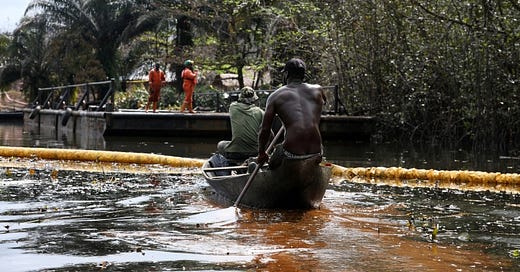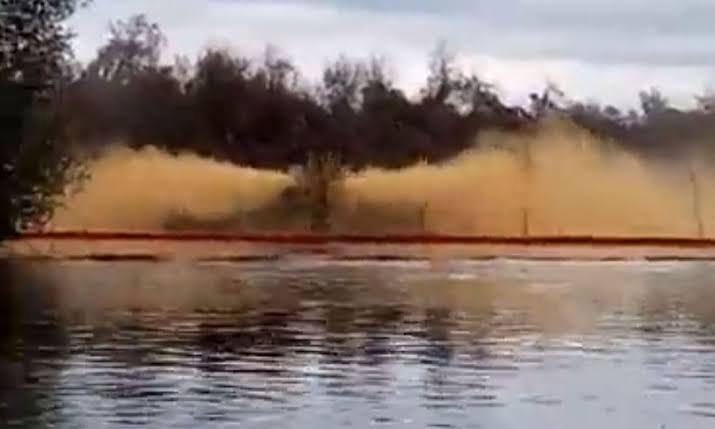Climate Change, Oil Spill: A Nigerian Town as a Parable
How does a town embattled by both oil spills and climate look like? Is it like any other normal town? Read below to find out.
Credit: Temilade Adelaja
Goodluck James paddled the canoe on the Santa Barbara River, watching the brackish water swishing and rolling. The smell of crude oil wafted from the river, while blackened trunks drifted by, the sun blazing from the sky, the brackish water rolling and swirling. The people on the bank bite their lip with anger, holding onto their paddles, hissing at the scene playing out before them, their clothes stained, the brackish water swishing and rolling. Goodluck watched the brackish water rolling and swishing past, on one afternoon in November last year, following yet another oil spill from the platform of Aiteo Eastern E&P, which took over the wellhead from Royal Shell in 2015.
Not far away, Tony Ibagwa stood at the edge of the river, the oil-spill blackened fish nets stretched out on the ground. A few meters from him, a fisherman gives a howl, hands on his head, on seeing his blackened fish nets on the ground. The odor of crude oil fills the air, with men and women pulling at their nose at the smell, their teeth biting their lips, as the blackened fish nets stretched out on the ground. There will be no fish today, Tony Ibagwa thought, watching the blackened fish nets lying stretched out on the ground, a victim of the oil spill.
Credit: The Whistler
“We’re fishermen,’ Tony told newsmen. “The mangrove provides what we use to survive. Now, everything has been destroyed by this spill.”
Before the oil spill came, the people suffered under the effects of climate change. Before the Aiteo wellhead spilled out its crude into the environment, people living in Nembe in Bayelsa State of Nigeria groaned over the climate change. With the Aiteo oil spill, fishing on their side of the Santa Barbara River is now unsustainable. With the fish nets now destroyed as they lay on the ground, people now have to forget about fishing. With their farms filled with the crude oil, they now have to forget about farming. This is land where climate change, oil spills, polluted rivers, and fleeing fish combine to make life nasty, brutish, and short, a parable for places elsewhere faced by climate change.
It’s climate change causing this. It’s climate change making Shell to leave Nigeria. It’s climate change, because investors, buckling under the pressure mounted on them by the climate change activists in their home countries, increasingly urge Shell to work towards net zero. Rather than leave Nigeria with honor, Shell wants to leave with speed. It wants to abandon everything. Rather than make remediation over its aging wellheads before leaving, it wants to abandon everything and give investors buying its installations aging wellheads, which cause oil spills under the pressure from climate change, their aging nature, possibly vandalization.
So now, oil spills sometimes spill in the surrounding communities for 32 days. So now, the people in Nembe groan over the effects of the oil spills. So now, the people of Nembe and the surrounding communities, embattled by a combination of oil spills and climate change, carry placards, marching on the streets of Yenagoa, bemoaning the destruction that has befallen their land. The victims come from far and near. They come from Eboh. They come from Obedum. They come from Emago-Kugbo. The management of the oil company had not shown sympathy over the destruction that has taken place on their land, so they come from Amoreokeni, Amuroto 1 and 11, from Emalo, Abu, and other places. The Nembe oil spill arrives with consequences. The Santa Barbara situation comes with consequences. In short, not just the oil spills at Santa Barbara and Nembe, but all oil spills that have taken place in the coastal region of Nigeria in the past five decades arrive with consequences. Oil spills in other places where fossil exploration takes place create consequences. It’s not a pretty sight having to cope with climate change. It’s not a pretty situation having to cope with oil spills. It’s not a pretty sight having to cope with aging wellheads. It becomes more problematic, no complicated, when communities have to cope with a combination of oil spills and climate change and aging wellheads at the same time, and having to convince people one day they’ll see pretty sights on their ancestral lands.
Credit: Vanguard
The Nembe oil spill devastated communities. It devastated the Santa Barbara river. The ruins at the impacted areas look so pathetic and so gruesome and so annoying, it’s no wonder people complain about the devastation caused by oil spills and climate change, two deadly brothers. It not only devastated the area, it pauperized the people. To survive, people accept bags of rice. To survive, they accept bags of salt. To survive, they accept cartons of noodles. First, oil production caused climate change and climate change caused their poverty, and in their pauperized state, they beg for salt and rice and cartons of noodles to survive. It’s happening in similar places the world over.
“The thing is affecting us because the entire Santa Barbara is polluted,” Preye Romiel told Daily Trust. “The oil is everywhere. The spill went on for a month, so our water is filled with oil. All the fishing settlements around that territory are affected.”
In other words, fish, which is one of the basis of the economy, swims away. Fish, which makes life meaningful for them, finds a way to escape the waters. Fish, their source of food and cash, becomes scarce. Sometimes, the fish doesn’t swim away or becomes scarce or escapes the crisis. It dies, suffocated by the oil spills taking over the land. Ill-health doesn’t affect fish alone – it also affects human beings. Trapped by oil pollution, people develop fever. People contact breathing problems. People’s immunity suffers. Difficulties arrive in the land when people develop fever and breathing problems and impaired immunity due to the presence of oil spills in the land, a situation worsened by the heat brought by climate change.
The heat affects not only fish and man but also affects another basis of the economy – the farms. Cassava no longer brings yields as it used to bring. Yam no longer grows as it used to grow. Tomatoes no longer bring yields as they used to bring. The oil spills, combined with the heat from climate change destroys the farms, so yam and tomatoes and cassava not only become shriveled and stunted, but also become less nourishing as they used to be in the past. In turn, the oil spills worsen the climate change, a circular process, going on round the world in places where exploring fossil fuel is the king.
Faced with this situation, the people abandon the farms. They abandon the rivers. They abandon streams and creeks. Since they’ve been forced to abandon the streams and rivers and farms, they wallow in poverty, and the only way to survive becomes through begging for bags of rice and bags of beans and cartons of noodles.
Experts predict increases in temperature in places like Nembe and other Nigerian cities in the foreseeable future. They predict storms. They predict dearth of fish. The people have to take their destinies in their hands to survive the terrible predictions over sea levels and temperature and fish. Of course, they have been taking their destinies in their hands. They have been crying on the streets. They have been crying before the gates of the oil companies. They have been crying before the government buildings. Oil companies and the government ought to take a responsibility for these oil spills, so the people must continue crying so the companies can provide a clean environment before they eventually leave.
And, in some cases, the oil companies don’t merit all the blames. Some of the people merit the blames. Lots of oil spills arise because greedy people, desperate to create illicit wealth, siphon fuel from the pipelines, vandalize the pipelines, destroy the pipelines, so they merit blame. People who merit blame should pay. The community people should make them pay. The government should make them pay. The security apparatus should be organized in such a way as to make deviants who vandalize pipelines and cause oil spills and intensify the effects of climate change and make ordinary people suffer should be made to pay.
But much more than this, the old activism against oil spills needs to change. It needs transformation. Change must happen in Ecuador. Change must happen in Nigeria. Change must happen in Mexico. In the past, people cry over the despoliation of their land, but in this era of climate crisis, change means they must not only cry over the despoliation of their land due to oil spills, but they must call for a cut back in the use of fossil fuel. Right now, they don’t care about climate change. They don’t care about the role of fossil fuel in the spread of climate change. They don’t care about the rising sea levels. In the near future, they would care about the rising seas and climate change and the use of fossil fuel, because they won’t only be crying over the destruction of their rivers through oil spills, they would be fighting for the survival of their very being, as climate change will make it necessary for them to fight for the survival of their being.







